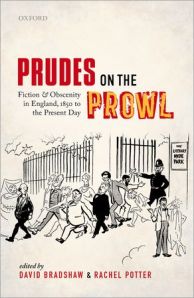I was carrying out a bit of a random internet search for information on the Lutetian Society who were responsible for privately publishing several of Zola’s books in the late nineteenth century. I didn’t find much, partly because I got distracted (as I usually do when searching for something online) by this book, Prudes on the Prowl: Fiction and Obscenity in England, 1850 to the Present Day, published by Oxford University Press in 2013 and edited by David Bradshaw and Rachel Potter. It consists of nine essays and although the whole book looks like a good read, the second essay is especially interesting to Zola enthusiasts – its full title is Pernicious Literature: Vigilance in the Age of Zola (1886-1899) and it’s by Katherine Mullin. It covers the emergence of literacy amongst the working class from 1870 and the perceived threat of ‘pernicious literature’, the rise and fall of the National Vigilance Association (NVA), the Vizetelly trials and the effects the Vizetelly trials had on English writers such as Thomas Hardy, George Gissing and George Moore. Oh, it also had a little bit on the Lutetian Society as well.
As it’s an academic book it’s very expensive – £50.00 for the hardback; but the Zola chapter is available on Google Books if anyone’s interested.

This sounds very interesting. Thank you for telling us about it. I have read Vizetelly’s With Zola in England and was very touched by his efforts and support for Zola.
LikeLike
Reading this essay made me realise that the Vizetellys didn’t stand a chance against the establishment. I start to wonder if their real crime, in the eyes of the establishment, was that they were making money from such ‘filth’.
I read ‘With Zola in England’ early this year and really enjoyed it. It was an interesting snapshot of a difficult period of Zola’s life.
LikeLike
The title and the cover–what a hoot! But I agree with Nancy, it sounds very interesting. The mention of Thomas Hardy reminded me of how he was so upset by the reaction to Jude the Obscure that he never wrote another novel, only poetry.
LikeLike
Apparently the term, ‘Prudes on the Prowl’ was used in the Daily Telegraph & Punch to lampoon them. In the essay Mullin shows how the prudes’ influence began to fade – thankfully.
LikeLike
*pout* When I followed the link all I got was an error message telling me that I’d reached my limit for the book. No luck searching local libraries either…
LikeLike
Ah! I checked that the link was ok before posting but maybe it doesn’t display properly outside the UK – for copyright reasons? I wonder if others have trouble accessing it? Have you tried just searching Google Books with the title?
I was surprised that the whole of the chapter that I wanted to read was on Google Books as I usually find it a waste of time.
I checked on my local (physical) library’s catalogue as well but it’s not available.
LikeLike
Or you may see it if you keep scrolling down. Chapter 2 is on pages 30-51. I had a look on the Australian Google Books and it seemed to miss the last few pages.
LikeLike
There’s a limit on the number of times some books can be viewed on Google Books. I had always thought that it was a personal limit, i.e. that Google tracked how many times *I* viewed it, but perhaps it’s a total limit for the book? Because you’re right, if I search for it, it brings up the book and I can read it just fine. So the problem arises only if I get there via your link. It’s the link that Google Books has blocked. Mysteries of the internet age, eh?
LikeLike
Click to access 010716ar.pdf
An article on the Lutetian Society
LikeLike
Thanks for the link Denise. I’ll read the article over the weekend.
LikeLike